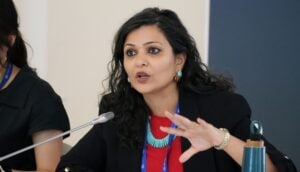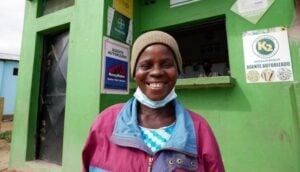At last year’s G8 summit President Obama highlighted the need to invest in African agriculture, announcing a new initiative aimed at driving sustainable agricultural productivity. Smallholder farmers in sub-Saharan Africa are the key to that initiative’s success. There are around 33 million smallholder farmers in the region, representing 80% of all farms and producing up to 90% of all agricultural output on the continent.
Enterprising Solutions
In anticipation of this year’s G8 meeting in the UK, we’d like to call attention to several NGOs that have adopted a business approach to successfully reach smallholder farmers and increase their productivity.
Farm Africa, for instance, has developed a private-sector model to help livestock farmers in Kenya, where experienced stockists are lacking and counterfeit products are prevalent. Their model helps farmers access good vaccines and other products, as well as trusted veterinary advice.
The company Farm Africa started is entitled Sidai, meaning ‘good’ in the Maasai language. Sidai is a network of franchised Livestock Care Centres owned and run by qualified veterinarians, livestock technicians and other livestock professionals. Each franchise provides farmers with high quality inputs and enables farmers to access advice to ensure their livestock, and income, can remain healthy. Thirty-two franchises already exist, reaching 60,000 households and aiming to reach those in more remote or generally poorer areas.
Similarly, One Acre Fund has also adopted a private sector-style model to help farmers increase their yields of staple food crops. Operating in Kenya, Rwanda and Burundi, One Acre Fund serves 130,000 smallholder farmers. It purchases seed and fertiliser at wholesale prices and then distributes those inputs within two-kilometres of where their farmer clients live. One Acre Fund then provides up-front credit for the inputs so that farmers can repay the loans (in cash) once their harvests have been collected, and also offers farmers advice and training through a network of full-time local field staff.
Betty Sangura, a smallholder farmer in western Kenya and client of One Acre Fund, has seen significant improvements to her life. Without One Acre Fund, Betty stated that her life “could be very, very poor because I wouldn’t have food in my home.” Betty can now afford to feed her family of seven as well as sending everyone to school.
Lastly, SNV has been working with agro-dealers in Zimbabwe via their Rural Agro-dealers Restocking Programme (RARP) to insure the financial risks of linking agro-dealers to wholesalers to receive agricultural inputs. This, in turn, helps these inputs to reach smallholders in remote regions where wholesalers were less likely to sell their products themselves. An estimated 113,800 farmers have accessed inputs in this way and have also been trained in business management.
One such fertiliser supplier involved in the programme, Nico Orgo Fertilisers Inc, praised SNV’s RARP scheme: “We have learned a great lot in the past one year, working with agro-dealers has been a wonderful experience. They have enabled us to increase our market penetration by almost 60% since we started working with them. Our aim is to have an agro-dealer in every ward.”
New Reports
Farm Africa, One Acre Fund, and SNV are all profiled in two new reports from Agriculture for Impact that offer a series of concrete recommendations and examples of how more inclusive and connected markets can benefit smallholder farmers in Africa.
The first report, Leaping and Learning: Linking Smallholders to Markets – a report commissioned by Agriculture for Impact and produced by the Overseas Development Institute – provides directions for policymakers, donors, investors and development practitioners on the most efficient ways they can support smallholders in Africa.
The second report, 8 Views for the G8: Business Solutions for African Smallholder Farm…, compiles the collective experiences of eight leading agricultural development organisations on how they are implementing these recommendations on the ground, and what the future priorities for action should be.
These reports highlight the key challenges that must be overcome for smallholders to reach their potential, including:
- Access – to inputs, finance and credit, storage and professional advice.
- Institutional capacity – to self-organise and benefit from economies of scale.
- Market information – related to standards, prices, risk management and enterprise skills.
- Public sector investment – in rural infrastructure, agricultural research and extension.
- Stable policy environments – avoiding unpredictable policy shifts, weak contract enforcement and restrictive trade flows.
A Variety of Solutions Needed
Though organisations like Farm Africa, One Acre Fund and SNV show that it’s possible to overcome the challenges above, it is important to take note of a few caveats when designing market-based interventions for smallholders. The Leaping and Learning report highlights three such considerations:
- Not all smallholder farmers are the same, and some may not be ready or willing to engage. As such, safety nets must remain in place for those farmers who either cannot be reached or who try but fail in their efforts.
- Scaling up programmes is not as simple as copying successful models; programmes must be adapted for different agroecological zones and socio-economic conditions.
- High-value cash crops such as cocoa and coffee often see more investment than staple crops. It is important that the latter are not neglected, and thus may require more public stimulus – at least, initially – to address access issues and to boost production and productivity.
Collaboration and Innovation is Key
Collaboration across sectors will be necessary to overcome the major barriers to helping smallholder farmers achieve their potential. To create an enabling investment climate, we need:
- Governments to provide rural public goods, such as sufficient infrastructure, education and health for smallholders and their families. Governments must also ensure that farmers have political support and adapt policies to empower farmers in supply chains.
- Donors to accept that engaging smallholders can take time and involve risks. They should work with NGOs to set up partnerships on the ground. Donors should also prioritise investments in staple crops over investments in cash crops, such as cocoa and coffee.
- Non-Governmental Organisations (NGOs) to pioneer innovative approaches to linking smallholders to markets and experiment with different models, as one size does not fit all in farming.
- Large-scale agriculture investors to recognise that smallholders can be effective suppliers but that finding sustainable solutions may take time.
All these sectors need to collaborate to ensure that markets work more effectively for everyone – including the most vulnerable smallholder farmers.









